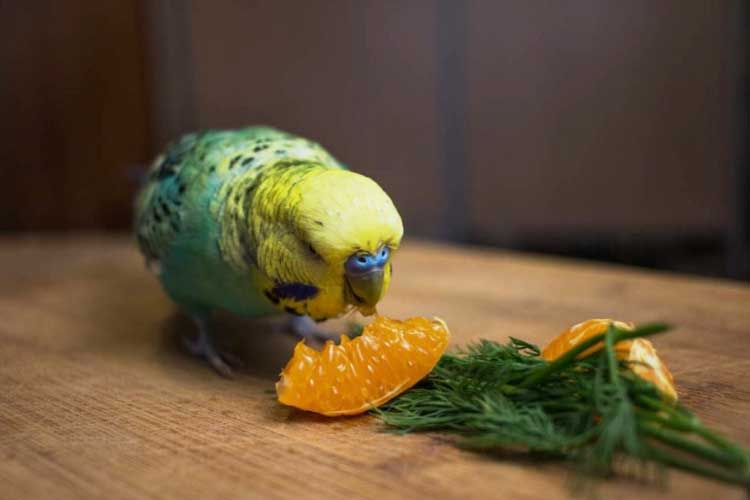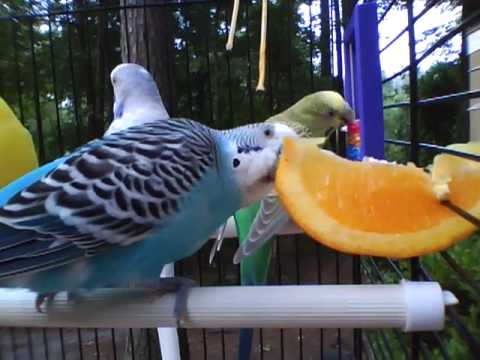Oranges are one of the most popular fruits consumed by humans. Chances are high that your budgie might have shown interest in your piece of orange and even tried snatching it from you. But before you share this fruit with them, read this guide to confirm if it’s a safe fruit for your pet bird.
Can budgies eat oranges? Yes, oranges are one of the safe fruits for budgies to eat. They’re tasty and healthy fruit for budgies packed with fiber, vitamins, and minerals, which benefit your pet bird’s health. However, an orange contains high sugar, and you should only feed it to your bird in moderation to avoid health issues like loose droppings and weight gain.
Let’s dive into more details below on feeding oranges to budgies, including how much of this fruit to give to your budges, which parts to give the bird, and how to prepare the fruit properly for the budgies.
Can you feed oranges to budgies?
You can feed your budgies oranges as a tasty treat for nourishing their nutrients. This fruit is 100% safe for the birds and helps you achieve a varied diet for your budgies, which should contain about 20% fresh vegetables and fresh fruits.
Oranges are usually packed with essential nutrients that your budgie’s body requires to stay healthy. These include folate, fiber, thiamine, antioxidants, and vital Vitamin C.
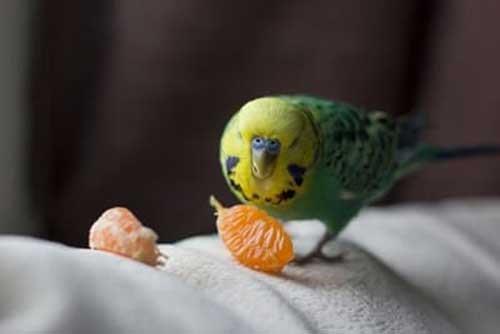
Before feeding an orange to your bird, it’s important to prepare it properly to ensure you safely feed your budgies this fruit. Washing it correctly is essential to eliminate harmful pesticides and chemicals on its peel. Chopping it up into small pieces also makes it easier for your budgies to eat (get more details below on how to prep orange for budgies).
However, this citrus fruit should be given to budgies occasionally and shouldn’t be part of their staple diet. This is because it contains high sugar content (fructose), which can be too much for the budgies small body system to digest—leading to health issues like watery droppings and weight gain.
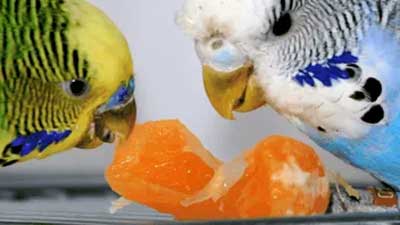
Like other citrus fruits, oranges also contain high citric acid. Too much of this acid tends to irritate the budgie’s stomach, causing stomach upsets in your bird and making them make watery and foul droppings
Do Budgies Like oranges?
Budgies like oranges. Remember, these fruits are sweet and juicy, making them a favorite treat for the parakeets. Multiple videos available on YouTube showing budgies enjoying this delicious fruit are enough proof to clear your doubts if budgies like oranges.
That being said, budgies react differently to the things you introduce in their cage. So you should expect anything when introducing the fruit to the budgies for the first time.
The secret is to take the whole process of introducing oranges to budgies slowly.
At times your budgie may be curious to know what an orange is, while others may look scared. If your budgie doesn’t seem interested in the fruit, try hand feeding them so they can trust you.
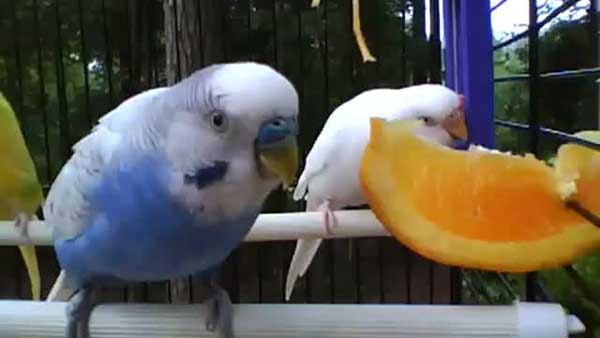
You may also try taking out the budgie food trays for a while. And when your budgie is hungry, offer them an orange!
But don’t feel bad if your budgie doesn’t eat the delicious pieces of oranges you have served him. You can introduce them the next day and the day after. Eventually, the bird will come around and its own time and try the tasty treat.
If your budgie completely ignores the fruit, move on to trying other fruits it may like, such as strawberries, bananas, grapes, watermelon, etc. These great alternatives are also powerhouse essential nutrients for keeping budgies healthy.
Health Benefits For Budgies Eating oranges
Oranges are good for budgies because they offer important nutrients that keep their health in check. Below, we take a closer look at the key nutrients these oranges provide and their health benefits.
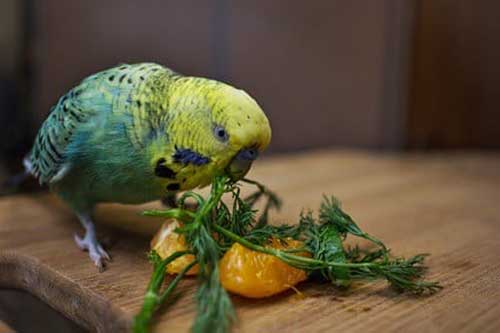
Fiber
The fiber in oranges helps ensure regularity and health of your birdie’s digestive system. It helps soften their stool, making it easier for your pet bird to pass waste through their body. This Nutrition Research study also suggests that fiber in citrus fruits helps control cholesterol levels, giving your budgies more energy and increasing their lifespan.
Vitamin A
Vitamin A in oranges helps promote their immune health by working closely with other nutrients found in the fruit like folate, copper, and others. This vitamin is also beneficial for healthy eyesight. It keeps the cornea functioning correctly while protecting your pet’s eyes from age-related issues.
Vitamin C
Oranges are also rich in Vitamin C (aka ascorbic acid). This vitamin is essential in strengthening your bird’s immune system and preventing diseases. It also helps stabilize blood sugar levels, stabilize cholesterol, prevent forming bad cells, ensure healthy muscle and bone development, and more.
Folate
Oranges are a great source of folate needed to manufacture white and red blood cells in the bird’s bone marrow. This means improved nutrients around the body and protection against illnesses. This nutrient also helps convert carbohydrates into energy to keep your feathered friend chatty and playful.
How much oranges should budgies eat?
You should give your budgies oranges note more than once a week. The citrus fruit is high in fructose (natural sugar found in fruits). And giving it in limited quantities is essential to prevent your budgie from overfeeding health problems like weight gain.
When the birds take in too much fructose, it proves hard for their small body to digest, leading to runny dropping and making them feel sick. Continued high fructose intake can lead to weight gain and obesity in your budgies.
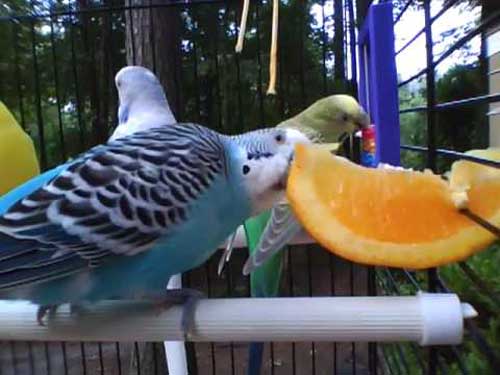
As you already know, oranges also pack high amounts of citric acid. Giving an excess of it to your birds can irritate your budgie’s stomach, causing stomach upset and watery droppings.
Overall, offer oranges to your budgie in moderation. Make it an occasional treat that you give them once every week. These small treats are safe for your budgies to gain all the health benefits offered by the budgie while giving them something tasty and colorful to explore inside their cage.
How do you prepare oranges for budgies?
Now that you already know oranges are safe for budgies, the next thing you might be asking is how you should prepare them. Should you remove the peel and seeds before giving the fruit to budgies?
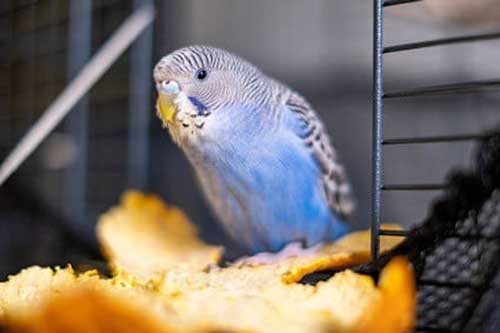
Let’s find out…
Peel the orange
While the orange peel is safe for budgies, we don’t recommend feeding it to them. Unless you get organic oranges, chances are high that the orange peel was sprayed with pesticides and fungicides by the farmers.
These harmful chemicals could still have been absorbed into the peel and can be quite toxic for your little feathered friend. For maximum safety, just peel the orange before giving it to your beloved bird.
Chop it up!
Some folks suggest putting the orange as a whole in your budgie’s cage. But we advise you to chop it up into small pieces. This makes it easy for your budgies to eat.
Moreover, it makes it easier for you to monitor how much orange your budgies eat.
In other words, you can easily control the quantity of oranges you feed by counting the number of pieces and adjusting if your bird shows any side effects after taking this tasty treat.
Serve the fruit
Once you have cut the orange into small pieces, you can offer it to your budgie. You can do this by hand-feeding them or just placing the fruit in the cage.
Additional tips for feeding oranges to budgies:
- If you want, you can also give orange juice to your budgies. However, ensure you only offer fresh juice, hand-pressed by you and not from a packet. You should also dilute it with water before presenting it to the birds to reduce the number of calories. And don’t make the juice a replacement for water for your budgies.
- You can also offer dried oranges to your budgies, provided they’re free from sulfates and sulfides. Or you can simply dry them at home by placing thin slices on baking try over parchment paper and letting them bake for a couple of hours.
- NEVER offer moldy or spoiled parts of orange to your budgie, as they can be detrimental to your bird’s health
- If you must offer the orange peel to your birds, make sure you buy organic oranges and wash them thoroughly to remove traces of dirt and other harmful substances on the surface that may harm your bird’s health.
NOTE: Always remove any leftover oranges from the cage after the budgies have taken to their fill. The orange pieces, like other fruits, can easily attract bacteria when you expose them to air for long hours. This can severely affect your budgie’s health and wellbeing.
Can you feed oranges to baby budgies?
You can feed oranges to baby budgies, but you must ensure you give them moderately and prepare them correctly to avoid causing them health problems.
If possible, get fresh organic oranges for your baby budgies, and be sure to wash them thoroughly before serving them to your little feathered friends. You also want to cut them into smaller pieces that they can easily eat and remove all the seeds to prevent a choking hazard in your budgies.
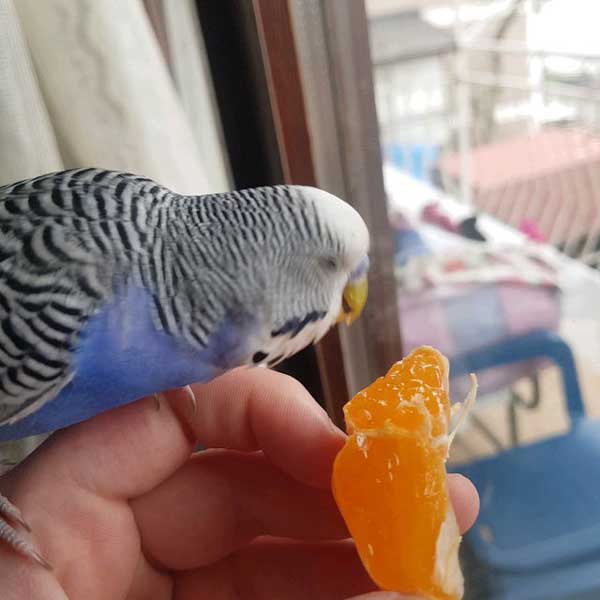
Like in adult budgies, you should feed oranges to baby budgies in moderation to prevent upsetting their stomach or absorbing too much sugar, which can lead to watery droppings and weight gain.
Video of a budgie Eating oranges
Still undecided on whether to feed oranges to budgies? Watch the video below of a group of adorable budgies chirp with joy as they eat a slice of orange
Related questions (FAQ):
Oranges are not poisonous to budgies; you can give them to your pet birds without any fears or worries. The fruit is packed with essential nutrients that promote good health in budgies. However, oranges may have side effects on your budgies if you feed them too much. This is because they contain high amounts of sugar, which can prove too much for their bodies to digest, leading to health issues like weight gain.
Yes, budgies can eat orange peels since they’re non-toxic and safe. However, we advise you to get rid of the peels because they could carry pesticides and other harmful chemicals that can affect your budgie’s health. If you must feed this part to your budgie, ensure you get organic oranges and wash the peel properly before giving it to your feathered friends.
Budgies can eat orange seeds as they’re non-toxic and safe for their body. This means you don’t necessarily need to remove them before feeding the fruit to your birds. Most budgies eat the flesh around the seeds and leave the seeds. However, given the big size of these seeds, you may want to remove them to prevent choking hazard in your birds, especially baby budgies.
Final word
Oranges are safe and okay to give to your budgie. The fruits are delicious and offer your bird essential nutrients like vitamins, minerals, and dietary fiber, making them a healthy snack for your budgie.
But this fruit contains high sugar content. Too much of it can be hard for your budgies to digest properly and cause health problems like loose droppings and weight gain. Only feed this a small amount of orange to your bird and do it moderately, say once a week.
Unless you’re giving your budgies organic oranges, remember to get rid of the peel as it may carry pesticides and fungicides that can harm the little pet.
Do you know if your budgies can eat cabbage or carrots? Read our articles about it to learn more.
